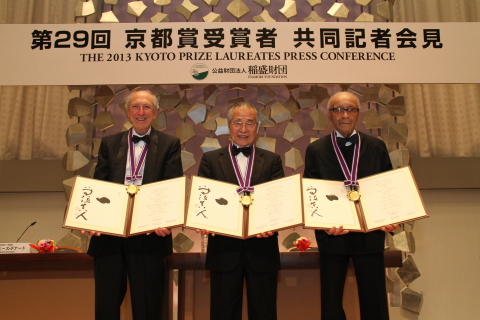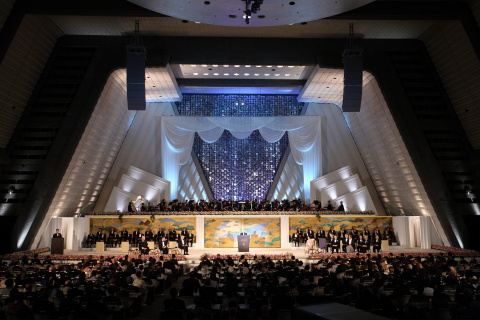KYOTO, Japan--(BUSINESS WIRE)--The non-profit Inamori Foundation (President: Dr. Kazuo Inamori) presented its 29th annual Kyoto Prize, Japan’s highest private award for global achievement, during a formal ceremony today. Electronics Engineer Dr. Robert Dennard was honored in the category of Advanced Technology (field: Electronics); Dr. Masatoshi Nei in Basic Sciences (field: Biological Sciences); and jazz pianist Cecil Taylor in Arts and Philosophy (field: Music). Each laureate received a 20-karat gold Kyoto Prize medal, a cash gift of 50 million yen (approximately US$500,000) and a diploma in recognition of lifelong contributions to society.
All three recipients are Americans continuing to work well into their 80s, providing real-life proof of the adage, “Do what you love, and you’ll never work a day in your life.” Dr. Dennard is an IBM Fellow whose pivotal invention plays a key role in most digital devices; Dr. Masatoshi Nei works as an evolutionary biologist and professor at Penn State University; and music pioneer Cecil Taylor is one of the most original pianists in the history of jazz music, who also pens poetry.
All three laureates are in Kyoto for the week attending the ceremony, holding lectures and workshops, and participating in youth development programs at area institutes. They will reconvene in San Diego, Calif., March 17-20, 2014, to participate in North America’s 13th annual Kyoto Prize Symposium, a three-day celebration of the lives and works of the laureates with an opening Gala and ongoing lectures at San Diego-area co-host universities.
2013 Kyoto Prize Laureates
IBM Fellow Dr. Robert Dennard, 81, invented the basic structure of Dynamic Random Access Memory (DRAM), which is now extensively utilized as an integrated circuit (IC) memory system. Since the 1970s, his innovation has immensely increased the capacity of digital information storage, leading to dramatic progress in information and telecommunications technology. Dr. Dennard and his colleagues also proposed guidelines called “scaling theory” to miniaturize field-effect transistors (FET), which play key roles in most ICs (including DRAM) thereby promoting an epochal advance in IC technology.
Evolutionary Biologist Dr. Masatoshi Nei, 82, made it possible to discuss evolutionary divergence, genetic diversity, and the mode of selection on genes in a quantitative manner by devising various statistical methods ― such as Nei’s Genetic Distance ― and applying them to molecular data. Using these methods, Dr. Nei’s research has yielded important contributions to molecular evolutionary biology as well as many other academic disciplines, including ecology and conservation biology.
Music visionary Cecil Taylor, 84, is one of the most original pianists in the history of jazz. He developed his unique style of improvisation by departing from conventional idioms through distinctive musical constructions and percussive renditions, thereby opening new possibilities in the genre. His unsurpassed virtuosity and strong will inject an intense, vital force into his performances and recordings, which has exerted a profound influence on music in general.
About the Inamori Foundation and the Kyoto Prize
The non-profit Inamori Foundation was established in 1984 by Dr. Kazuo Inamori, regarded among Japan’s most respected business leaders. Inamori founded the multi-billion dollar Kyocera Corporation as a startup in 1959; and KDDI Corporation, Japan’s No.2 telecommunications provider, in 1984. He created the Kyoto Prize in 1985, in line with his belief that a human being has no higher calling than to strive for the greater good of society, and that the future of humanity can be assured only when there is a balance between our scientific progress and our spiritual depth.
To date, the prize has honored 93 individuals and one not-for-profit enterprise (The Nobel Foundation), collectively representing 15 nations. Individual laureates range from scientists, engineers and researchers to philosophers, painters, architects, sculptors, musicians and film directors. The United States has produced the most recipients (39), followed by Japan (16), the United Kingdom (12), and France (8). Seven Kyoto Prize winners have subsequently been recognized with the Nobel Prize, including the 2012 Nobel recipient in Physiology or Medicine, Dr. Shinya Yamanaka (2010 Kyoto Prize laureate in Advanced Technology). For more information about the Kyoto Prize and a webcast of the ceremony, visit http://www.kyotoprize.org/en/.





